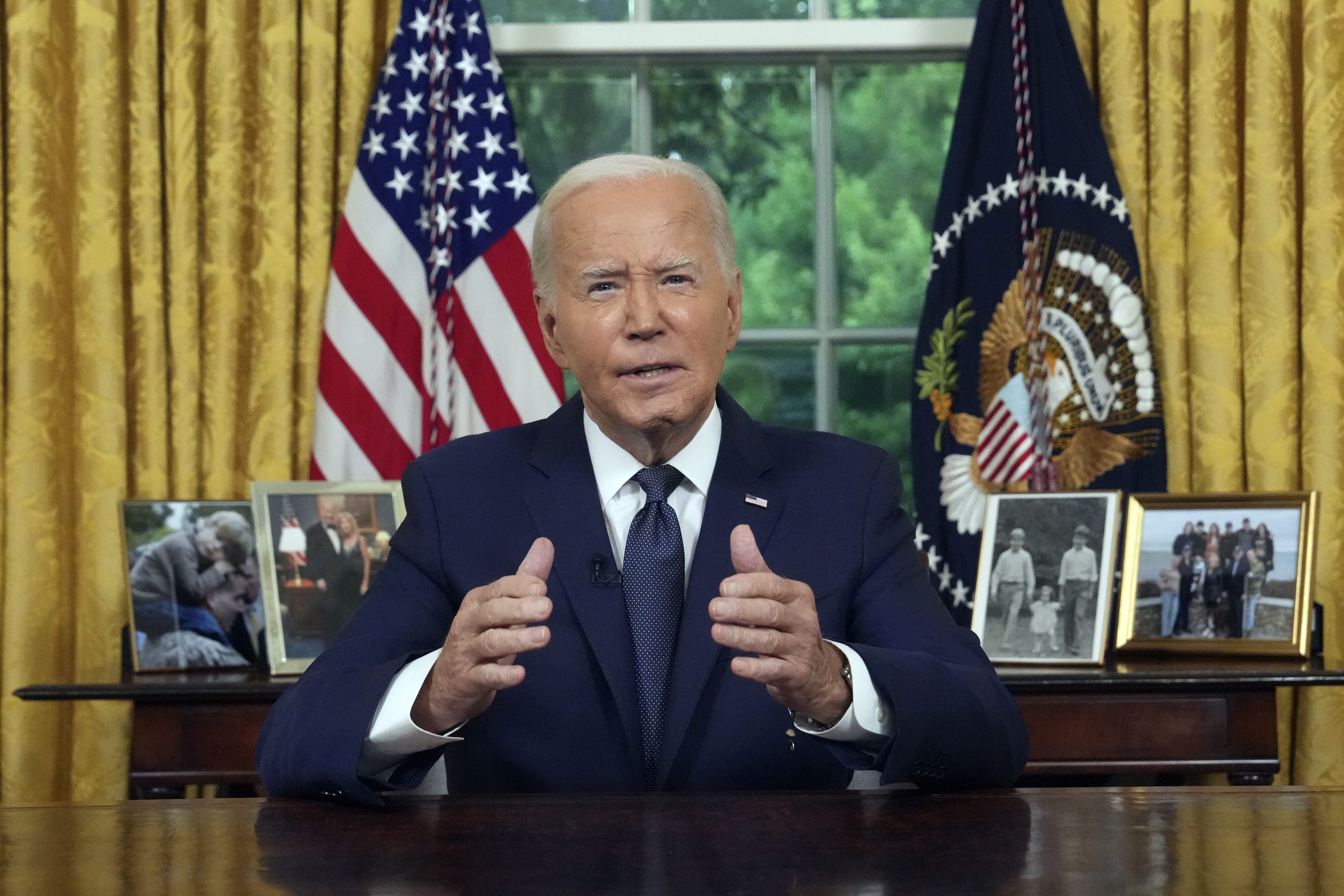The assassination attempt on Donald Trump not only gave Joe Biden a respite from the offensive launched by the critical sector of his party to force him to run for re-election. It also allowed him to play the card that led him to the White House in 2020: that of the conciliator fighting for national unity.
That is the message the president delivered last night in an address to the nation from the Oval Office. "Even as we disagree, we are not enemies; we are neighbors, co-workers, friends, and, most importantly, Americans," Biden said in his message, which, although brief (less than six and a half minutes), gave him time to slip up when referring to "former Donald Trump," thus omitting the word "president," as the Republican presidential candidate is in good health after the assassination attempt and spent Sunday playing golf in New Jersey before traveling to the city of Milwaukee, where his party's Convention begins on Monday, where he will be officially nominated as the presidential candidate and will also announce his running mate.
Currently, there are two finalists: Ohio Senator JD Vance, whose selection would indicate that Trump will adopt a much tougher policy if he wins the election, and Florida's Marco Rubio, whose election would be a nod to the U.S. establishment. If the vice presidency goes to the former of these legislators, Rubio would be a strong candidate for the position of Secretary of State.
In his speech, Biden confirmed that he had spoken with Donald Trump on Saturday, hours after he was lightly injured when one of the bullets fired by Thomas Matthew Crooks grazed the top of his right ear. The former president is literally alive by a matter of two centimeters. One of the attendees at the rally in Butler, in Pennsylvania, where the assassination attempt took place, was not as lucky and died instantly from a shot to the head. Two other people are seriously injured, but in stable condition.
At the moment, U.S. authorities are maintaining strict silence about the assassin, who was killed on the spot by the Secret Service, the security force responsible for protecting the president, diplomats, and foreign leaders in the U.S. While Republicans accuse the left and the Democrats, the latter tend to think that Crooks was nothing more than a madman with a sophisticated weapon, a type of person that unfortunately abounds in the U.S., a country that has 4% of the world's population but more firearms than the other 96% combined. But these are just speculations without any basis in reality. Until an official version is released, everything will be mere speculation.
However, the Secret Service is under fire for allowing Crooks, a 20-year-old person with no military training, to climb onto the roof of an industrial building 130 meters away from Trump and shoot at him with a semi-automatic rifle. Truth be told, mishaps involving the Secret Service are not uncommon. Despite the sunglasses and tough guy demeanor of its members, their scandals make them resemble Mortadelo and Filemón but with prostitutes.
In 2012, in a notorious scandal, one of its members, who was protecting Barack Obama during a visit to Colombia, caused a scandal reminiscent of a farce when he refused to pay a girl he had hired to take back to the hotel after a night of revelry with agents from the U.S. Drug Enforcement Administration (DEA). The agent in question apparently thought the girl had gone with him for his looks and conversation, not for his money, which led to an incident halfway between a security crisis and a comedy, especially when photos surfaced on Facebook of the agent in question, David Chaney, staring at the rear of former vice presidential candidate and Alaska governor, Sarah Palin, and openly celebrating it.
Chaney was not an isolated case. A subsequent investigation revealed that eleven of the agents who had gone as an "advance team" to the Caribbean city where a summit of heads of state and government from across the Americas was taking place had dedicated themselves to thoroughly examining the amorous skills of Colombian prostitutes, in a country where, unlike in the United States, such activity is legal.
It's not always about prostitutes. Donald Trump's youngest daughter, Tiffany, hooked up with one of them. The ex-wife of Donald Trump Jr., the president's eldest son, Vanessa Trump (who has not stopped using her ex-husband's surname, perhaps for branding reasons, as it is much more well-known than hers, Pergolizzi). It was during those years that one of Vice President Mike Pence's bodyguards - a strict evangelical who never dined alone with a woman for fear of what might happen - was caught in a brothel in the city of Baltimore, near Washington, in the U.S., where prostitution is illegal and punishable by jail time.
Others, rather than sex, have turned to the bottle. There have been Secret Service members - including elite units - who have drunkenly crashed their cars into the White House fence. In fact, until 2014, Secret Service personnel were allowed to drink - albeit in moderation - while on duty. In 2015, in a famous case, upon being alerted to the presence of a bomb package (which turned out not to be one), a Secret Service agent stationed near the Department of the Treasury ran away, displaying agility but not bravery.
But all those mishaps were public relations disasters. What happened on Saturday was a tragedy and bordered on an assassination. Now, the search for accountability may finally lead to the long-delayed reform and professionalization of the Secret Service, whose members seem much more adept at dressing as if they were cast members of the defunct TV show 'Caiga quien caiga,' strutting around like John Wayne and arbitrarily closing streets or buildings rather than ensuring the protection of the leaders under their care.
